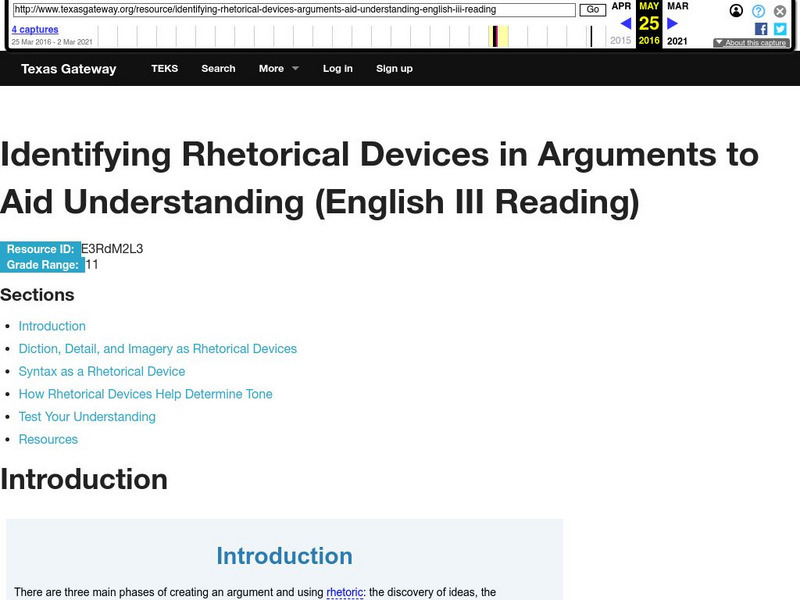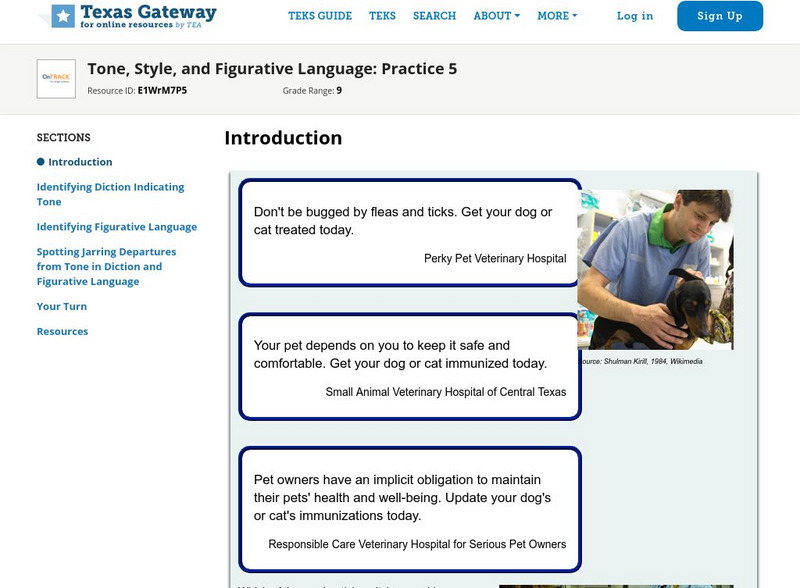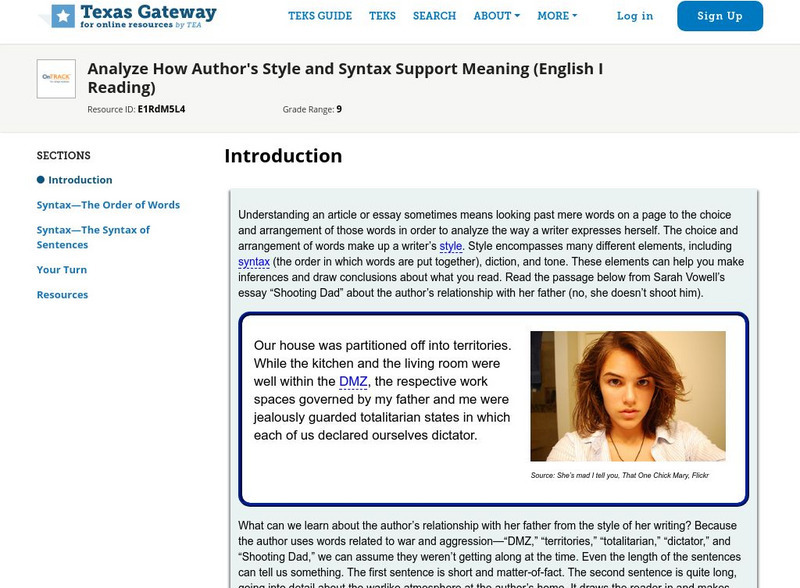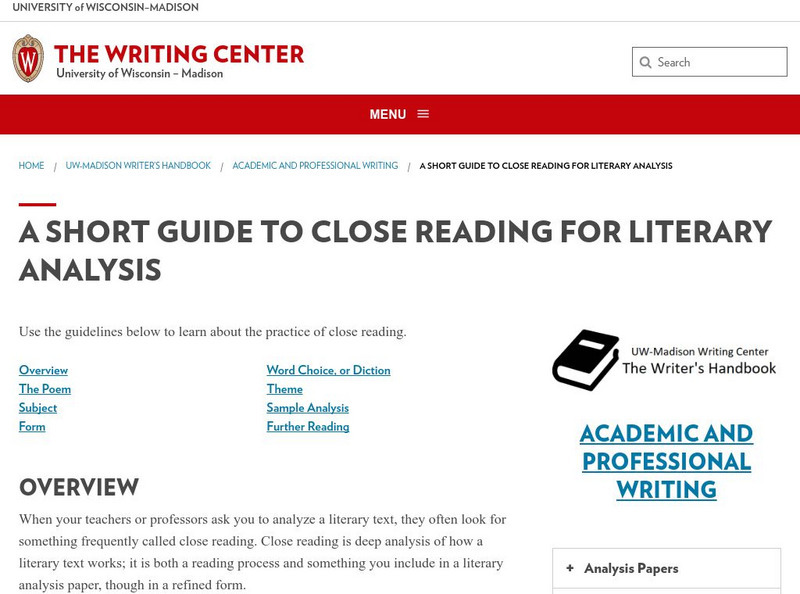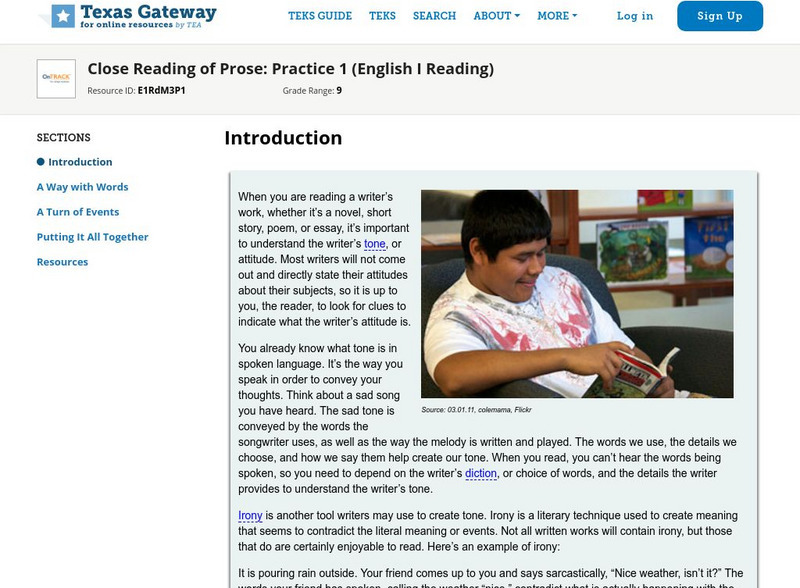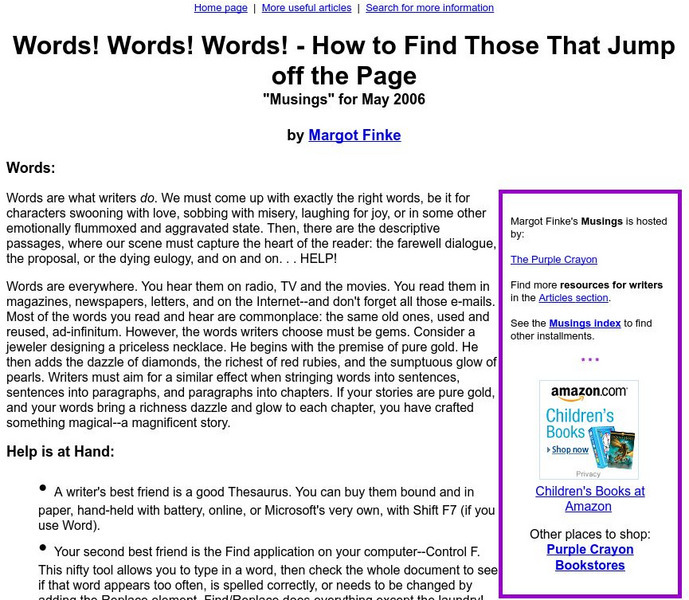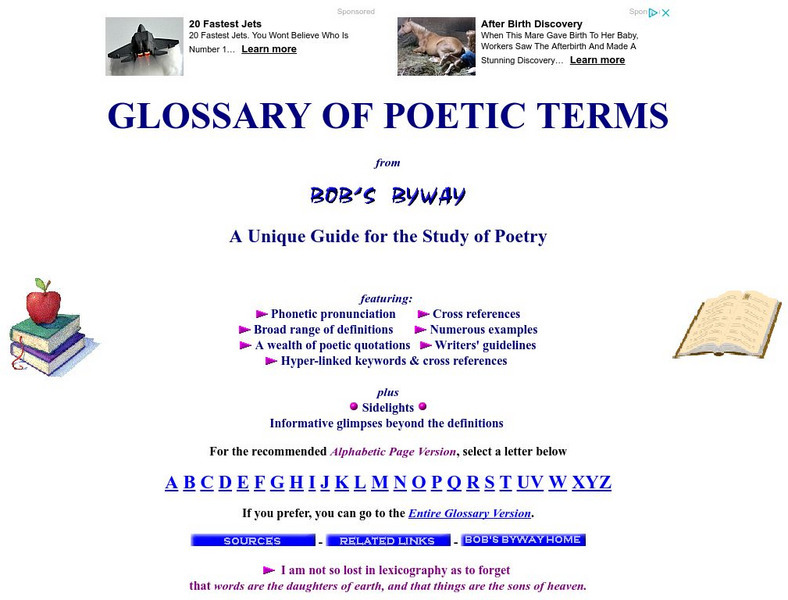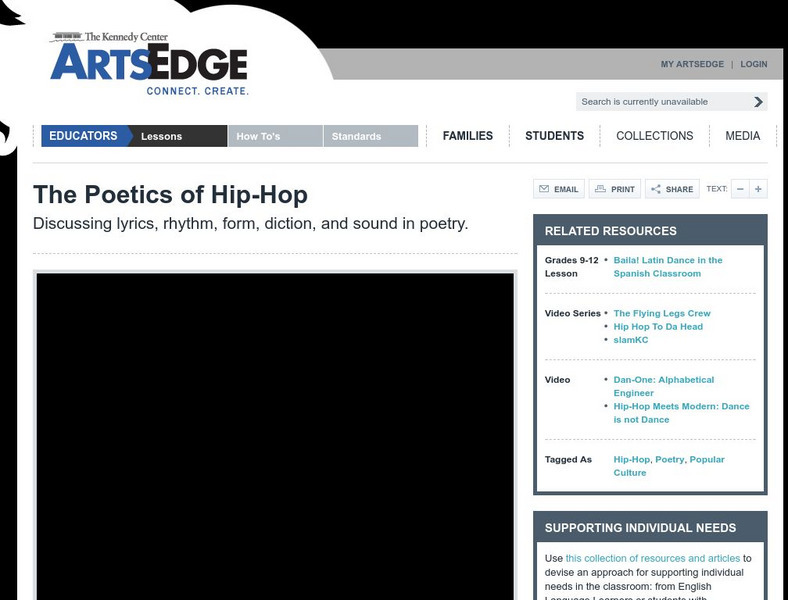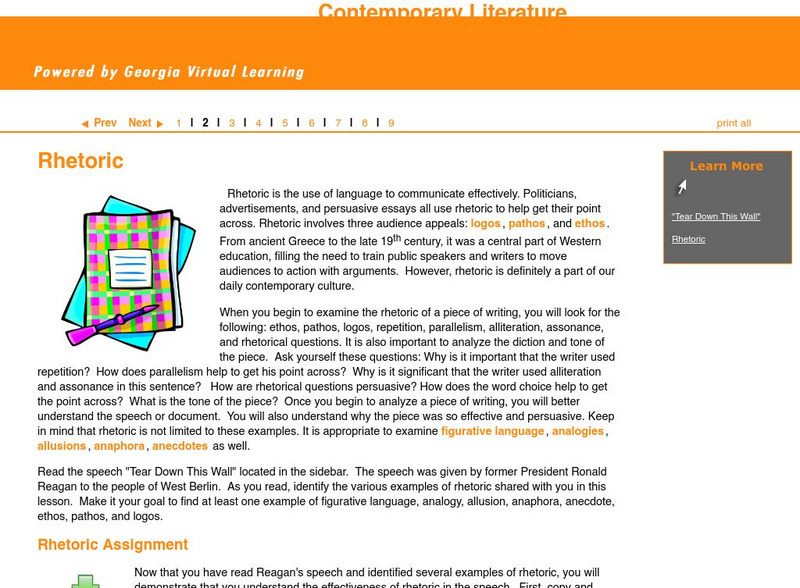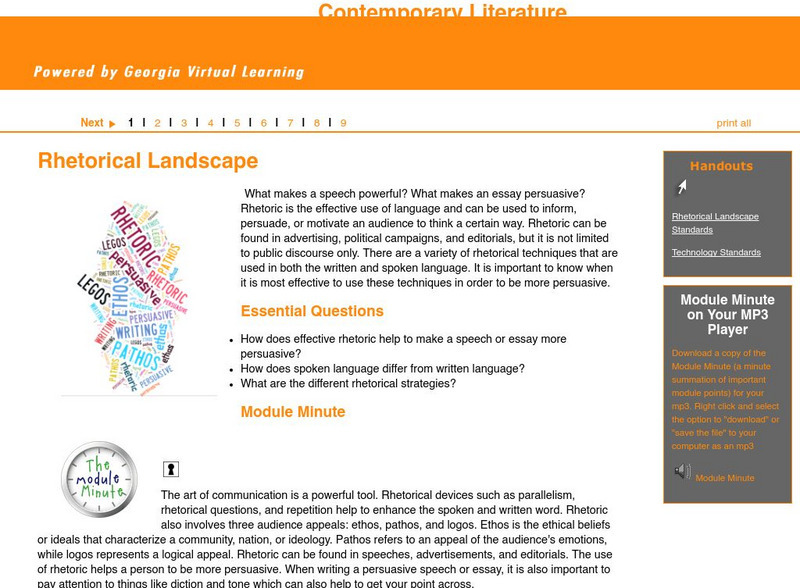Texas Education Agency
Texas Gateway:diction and Tone (English I Reading)
In this learning module, the user will learn and apply the concepts of tone and diction. Tone is the author's attitude toward the writing. Tone is largely determined by diction or the words that an author chooses.
Texas Education Agency
Texas Gateway: Tone, Style, and Figurative Language: Practice 5
Mark examples of figurative language and the diction that indicate tone.
Georgia Department of Education
Ga Virtual Learning: Analyzing Poetry [Pdf]
This resource explains how to analyze a poem for its subject, narrator, tone, diction, and more. "Open" and "closed" poems are defined. Explanation are provided for "metrical feet" and "rhyme scheme" in poetry. William Shakespeare's "My...
Texas Education Agency
Texas Gateway: Identifying Rhetorical Devices in Arguments to Aid Understanding
This lesson focuses on the expression of ideas, the stylistic choices writers make. Because the range of choices is so broad, the activities in the lesson will focus on DDIST: (Diction, Detail, Imagery, Syntax, Tone) to help you remember...
Texas Education Agency
Texas Gateway: Tone, Style, and Figurative Language: Practice 5
Mark examples of figurative language and the diction that indicate tone.
Texas Education Agency
Texas Gateway: Analyze How Author's Style and Syntax Support Meaning
This lesson focuses on understanding an article or essay by looking past mere words on a page to the choice and arrangement of those words in order to analyze the way writers express themselves. The choice and arrangement of words make...
Texas Education Agency
Texas Gateway: Close Reading of Prose: Practice 2 (English Ii Reading)
In this lesson, students practice reading closely so that you can identify the choices that help create tone, diction, and irony.
University of Wisconsin
Univ. Of Wisconsin: Writing Center: Guide to Close Reading for Literary Analysis
This guide discusses how to approach analysis of a literary text, with the main focus being on the poem "Design" by Robert Frost. It explains how to examine the subject, the form, word choice or diction, and the theme. In each section,...
Other
Prezi: Tone, Diction, and Analysis of Word Choice
Slideshow explores the connection between word choice and the author's tone.
Grammar Check
Grammar Check: 5 Weak Words to Avoid & What to Use Instead (Infographic)
An infographic is provided to help students replace ineffective word choices. Students will find a list of words to replace vague words and overused phrases.
Texas Education Agency
Texas Gateway: Close Reading of Prose: Practice 1 (English I Reading)
Read carefully in order to identify diction, tone, and irony and evaluate their impact on the meaning of a text.
Houghton Mifflin Harcourt
Holt, Rinehart and Winston: Elements of Literature: Style Chart [Pdf]
A brief organizer in which students can analyze a given selection's writing style. Includes sections on diction, figures of speech, images, and sentence structure.
Texas Education Agency
Texas Gateway: Close Reading of Prose: Practice 1 (English I Reading)
In this lesson, students practice close reading strategies to help them understand a writer's tone. They will examine the writer's choice of diction, details, and irony to identify the writer's attitude.
Texas Education Agency
Texas Gateway: Close Reading of Prose: Practice 1 (English I Reading)
As you read through the texts in this lesson, you will practice close reading strategies to help you understand a writer's tone. You'll be examining the writer's choice of diction, details, and irony to identify the writer's attitude.
Louisiana Department of Education
Louisiana Doe: Louisiana Believes: English Language Arts: Grade 9: Romeo and Juliet
Students explore how patterns and contrasts in language (diction, imagery, figurative language) reveal central ideas in texts and develop various motifs (light vs. dark, dreams vs. reality, high vs. low, etc.) in Romeo and Juliet. They...
Harold D. Underdown
How to Find Words That Jump Off the Page
An excellent resource for a writer struggling to come up with the exact words for which they are looking. Includes very helpful advice and information. Aimed at writers of children's literature, but can also apply to other genres.
Robin L. Simmons
Grammar Bytes: Word Choice Exercises
Students engaging in these 14 word choice exercises will improve their word usage skills. Topics include spelling mistakes, sound alike words and word confusion. Select the correct word usage for each sentence.
Other
Bob's Byway: Glossary of Poetic Terms
Calling itself "unique," Bob's is easy to use, with cross-links throughout, phonetic pronunciation guides when necessary, and many examples and quotations. Click on the letter and scroll for the word.
ClassFlow
Class Flow: Be More Descriptive
[Free Registration/Login Required] This flipchart helps students find synonyms for tired, dull words in order to make their writing more interesting.
Texas Education Agency
Texas Gateway: Tone, Style, and Figurative Language: Practice 5
A learning module that teaches students about tone, style, and figurative language in five mini-lessons: Introduction, Identifying Diction Indicating Tone, Identifying Figurative Language, Spotting Jarring Departures from Tone in Diction...
John F. Kennedy Center
The Kennedy Center: The Poetics of Hip Hop
Students will analyze form in Shakespearean sonnets and hip-hop music. Concepts viewed in-depth include rhythm, form, diction, and sound. [Requires QuickTime 7].
University of Pennsylvania
U. Penn: Notes on "Lyrical Ballads"
This etext is the original notes, preface, and advertisment for the book "Lyrical Ballads," by Samuel Taylor Coleridge and William Wordsworth.
Georgia Department of Education
Ga Virtual Learning: Contemporary Literature: Rhetorical Landscape: Rhetoric
This lesson focuses on rhetoric; it defines it, discusses rhetorical devices, and audience appeals. It includes a student assignment to read "Tear Down This Wall" a speech by Ronald Reagan and then use the comment feature in Microsoft...
Georgia Department of Education
Ga Virtual Learning: Contemporary Literature: Rhetorical Landscape
This is an introduction to a unit on the use of rhetoric in speaking or writing to persuade an audience to the desired way of thinking or action. If focuses on rhetorical techniques and the three audience appeals: ethos, pathos, and logos.
Other popular searches
- Dictionary Skills
- Dictionaries
- Dictionary Skills Lesson
- Language Dictionaries
- Computer Dictionaries
- Biography Dictionaries
- Picture Dictionaries
- Acronym Dictionaries
- English Dictionary
- Dictionary and Thesaurus
- +Computer +Dictionary
- Dictionary Use


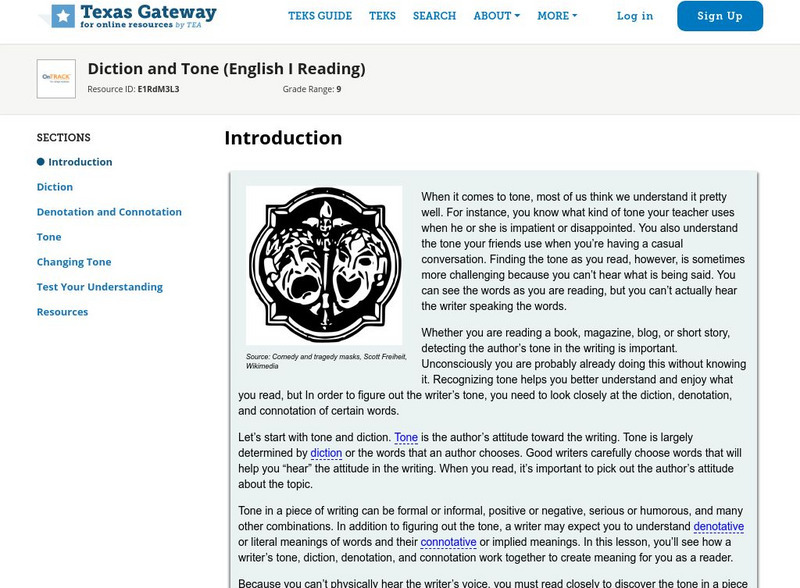
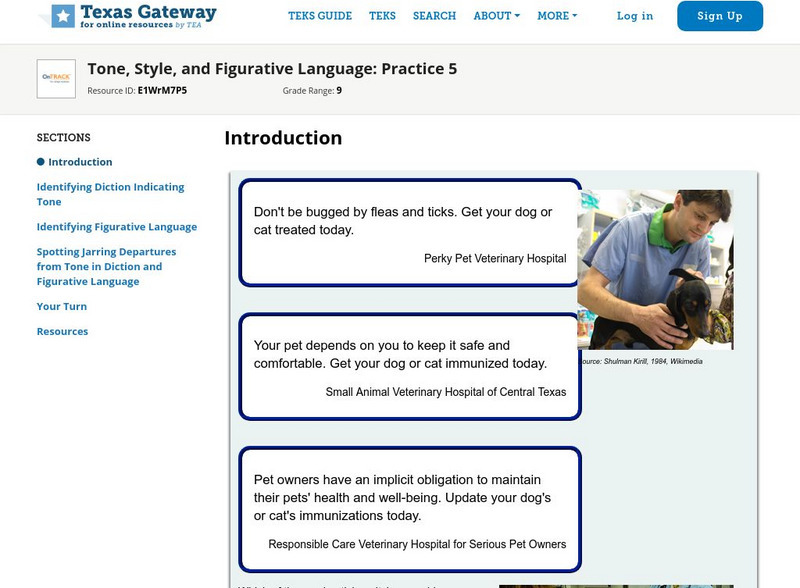
![Ga Virtual Learning: Analyzing Poetry [Pdf] Unit Plan Ga Virtual Learning: Analyzing Poetry [Pdf] Unit Plan](https://d15y2dacu3jp90.cloudfront.net/images/attachment_defaults/resource/large/FPO-knovation.png)
